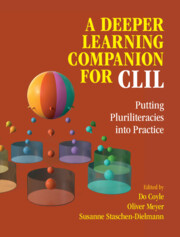Book contents
- A Deeper Learning Companion for CLIL
- A Deeper Learning Companion for CLIL
- Copyright page
- Contents
- Tables
- Figures
- Contributors
- Preface
- Part I Key Ideas and Principles of Pluriliteracies Teaching for Deeper Learning
- 1 Exploring the Mechanics of Deeper Learning
- 2 Exploring the Drivers of Deeper Learning
- 3 Exploring Progression in Deeper Learning
- 4 Designing Deeper Learning Episodes
- Part II Deeper Learning Episodes: First Steps towards Transforming Classrooms
3 - Exploring Progression in Deeper Learning
from Part I - Key Ideas and Principles of Pluriliteracies Teaching for Deeper Learning
Published online by Cambridge University Press: 04 February 2023
- A Deeper Learning Companion for CLIL
- A Deeper Learning Companion for CLIL
- Copyright page
- Contents
- Tables
- Figures
- Contributors
- Preface
- Part I Key Ideas and Principles of Pluriliteracies Teaching for Deeper Learning
- 1 Exploring the Mechanics of Deeper Learning
- 2 Exploring the Drivers of Deeper Learning
- 3 Exploring Progression in Deeper Learning
- 4 Designing Deeper Learning Episodes
- Part II Deeper Learning Episodes: First Steps towards Transforming Classrooms
Summary
In Beyond CLIL: Pluriliteracies Teaching for Deeper Learning we demonstrate that learning progressions typically evolve around big ideas in a discipline or a subject. Disciplinary core constructs show how disciplines or subjects use different approaches to collecting, analysing, evaluating and communicating information. This is why, in PTDL, those core constructs are used to inform and guide the development of learning progressions into/for individual subjects. Progress in subject learning is not linear but multi-dimensional and multi-directional. It involves specific ways of thinking and typical forms of representing information and specific text types or genres to share information. Progress in subject learning can be conceptualised as enhancing meaning-making potential. It entails growing conceptual understanding of content knowledge as well as a growing command of subject-specific procedures and strategies. It results from engaging in the specific major activity domains of a subject (doing, organising, explaining and arguing). This idea is captured in Figure 3.1.
- Type
- Chapter
- Information
- A Deeper Learning Companion for CLILPutting Pluriliteracies into Practice, pp. 9 - 11Publisher: Cambridge University PressPrint publication year: 2023



